CRJ 15:4 out now!
The next edition is now available to online subscribers, and is being mailed out to hard copy subscribers this week. Online subscribers: Please keep an eye out in your inbox, we also email you to let you know the edition is live!
Comment
Environment, economy and peace: elements of a systemic crisis
Serge Stroobants and Lea Perekrests say that ecological crises are significant threats to international stability as the Covid-19 pandemic exposes the vulnerabilities of an interconnected global socioeconomic system and threaten to upend an already fragile system
Unveiling the systemic nature of risks
The global pandemic has made it clear that societies and governments have under-invested in disaster risk reduction strategies. And this is even more true when it comes to climate change threats. But we can learn early lessons to assist a green and sustainable recovery from the Covid-19 crisis, write Rosalind Cook and Sebastien Penzini
Leadership & innovation
Terra Incognita: Vision and action
It is a sad but inescapable fact that today’s global situation demands that we lay to rest our pre-established crisis visions and move towards creative and flexible leadership, say Emily Hough, Patrick Lagadec and Matthieu Langlois
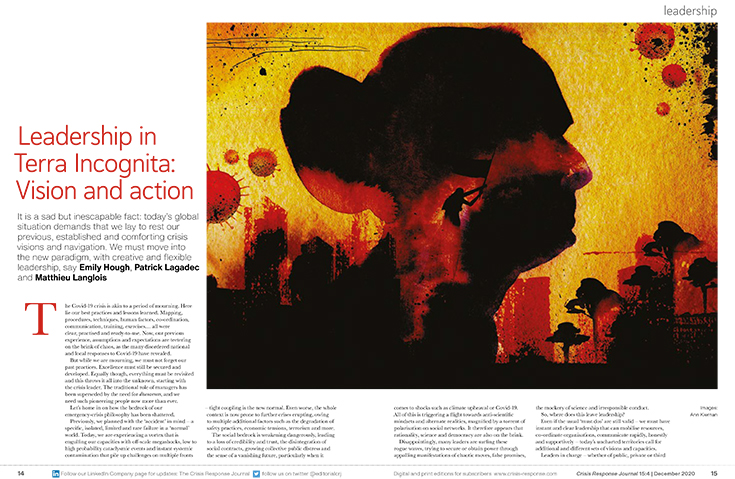
The danger of too many fresh eyes
There is no harm in having a fresh pair of eyes look over a project proposal or identify gaps in a response strategy, but crisis leadership demands full acknowledgement of knowledge limitations and humility in taking advice from those paid to know the subject. Unfortunately, this does not always happen
Kaleidoscopic learning
Most of us prefer to be optimistic rather than look at the downsides. But with the right approach, we can combine positive and negative thinking towards purposeful and positive action, says Gareth Byatt
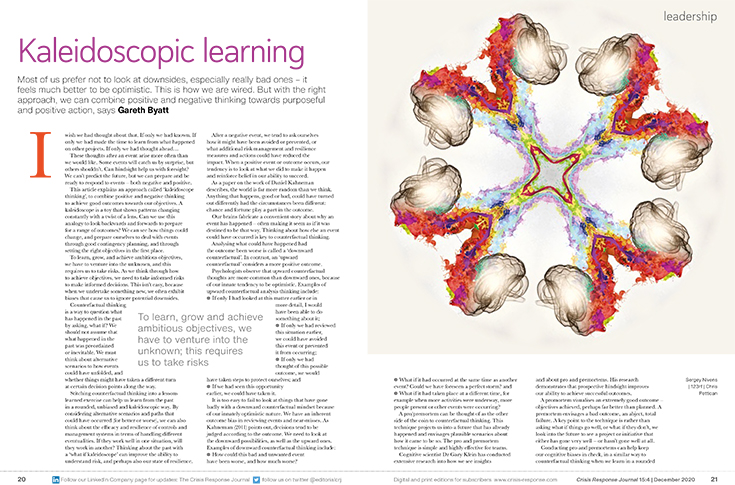
Leadership, AI and the collective brain
Artificial intelligence and data centres are causing social transformations that are changing our world. Jean-Jacques Martin asks what this means for leaders, exploring the concept of ‘neuromanagement’ and how a hierarchical, rigid company can be transformed into an ecosystem that absorbs informational energy flows and transforms them into added value within the new economy
Leadership powers
According to social psychologists, the bases of power as they relate to leadership include legitimate, reward, expert, referent and coercive. Randall Collins explores how this applies to emergency managers, both on a daily basis and in times of crisis
Why lawyers and communicators must work together
The age-old debate about the interaction between lawyers and communicators in a crisis still rages, and conflict between legal and communication advice is still a very real problem, according to Tony Jaques
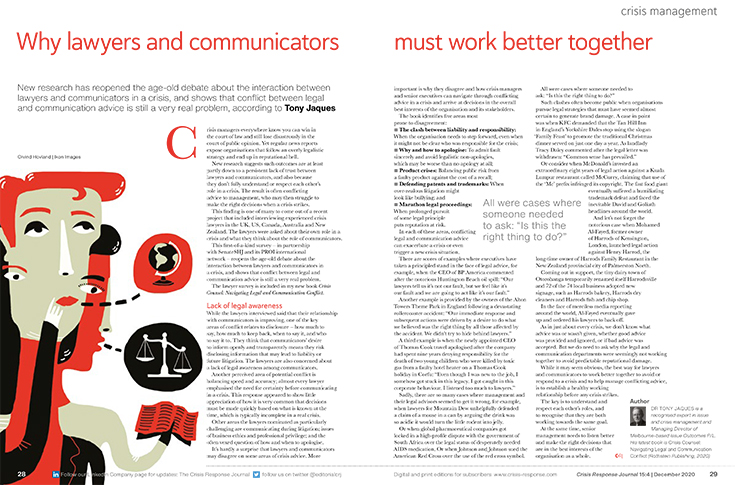
Systems and people: Time for transformation
Previously, David Wales provided insights into research that fundamentally changed understanding of the relationship between the public and those who provide services. Here, he contends that contemporary crises models are fundamentally unsuited to future needs
Crisis & urban areas
From refugee to responder
Alistair Harris describes how the Palestinian Civil Defence in Lebanon has been transformative for young refugees who once felt marginalised, by providing them with an opportunity to demonstrate personal agency and to reinforce a sense of purpose
Complex urban environments: Beirut
Urban designers, ecologists and social scientists have called for closer links between their disciplines, adapting the resilient cities concept. Albrecht Beck, Marc Arnold and Andra Covaciu argue that a focus on operational governance and first responder boots on the ground remains crucial
Disaster recovery by design
Idrees Rasouli outlines why he is setting up the Institute for Post Disaster Recovery, a centre of expertise to help cities, organisations and people prepare for and recover from disasters by design
Frontline & security response
Deliberate mass casualty incidents, a perspective from Spain
There is a multiplicity of medical care protocols, writes Juan José Pajuelo, but optimal co-ordination among – and the safety of – first responders still remain elusive
Technology to rebuild communities
Pix4D collaborates explores a use case in California following this year's devastating wildfires
Enhancing rural safety and security
In 2017, the UK’s Lincolnshire Police Department launched its aerial drone programme to improve public safety and reduce crime in a rural county. Charles L Werner shares its success stories
Keeping an eye out for deception
Andrew Staniforth presents his thoughts on the need to review and reform the radicalisation risk management process, saying that current practices are not enough to keep the public safe from radicalised individuals and returning fighters
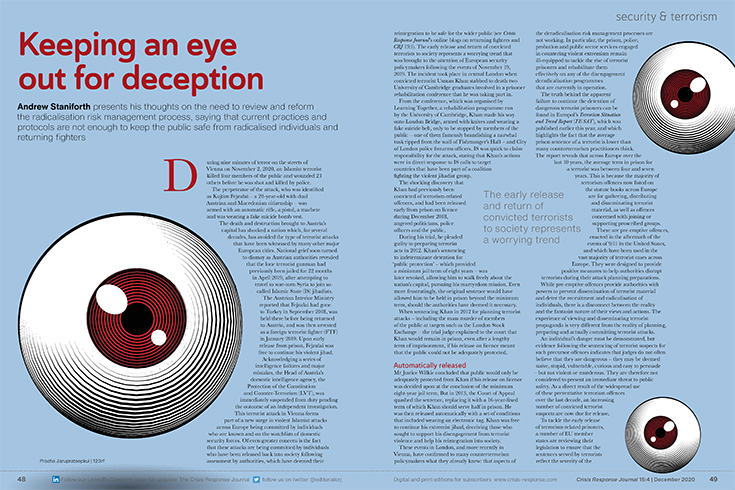
Embassies and security
Embassies, consulates, diplomatic missions and the people who work in them are a desirable target for terrorists, militants or angry mobs, writes Lina Kolesnikova
Covid-19
Pandemics and national insecurity
Confusion, disparate policies and indecision contribute to collective denial and people’s reluctance to give up their freedoms, according to Jennifer Hesterman. Here, she outlines the dangers of inaction and empty promises but, she says, there is a ray of hope that lies within our younger generations
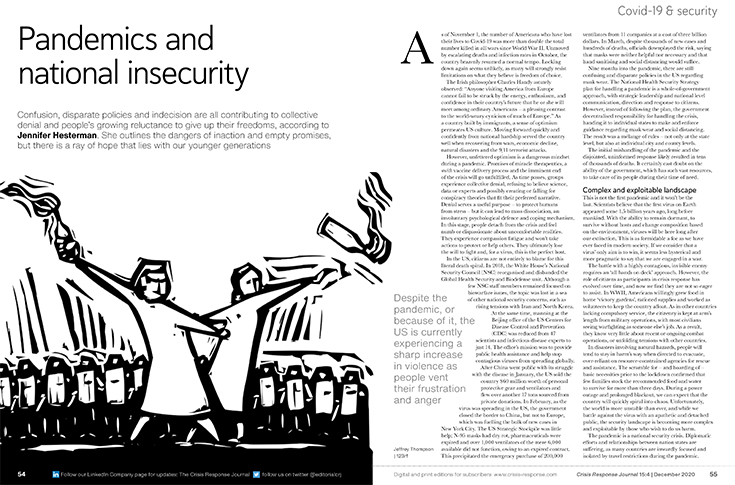
Private security services
In times of crisis private security services are essential, but they need more support and recognition, according to Catherine Piana
Covid-19 in a fragile and conflict-based area
Azzam Abuhabib, Samer Abuzerr and Said Abu Aita look at the authorities’ responses to the pandemic in the Gaza Strip and outline three possible future scenarios
Covid-19: India
In this unflinching and in-depth analysis, Dr Peter Patel reviews the pandemic management and challenges faced by this diverse and enigmatic country
No breathing room
Covid-19 and Pakistan’s smog problem have devastating parallels – and they’re about to collide, warns Luavut Zahid
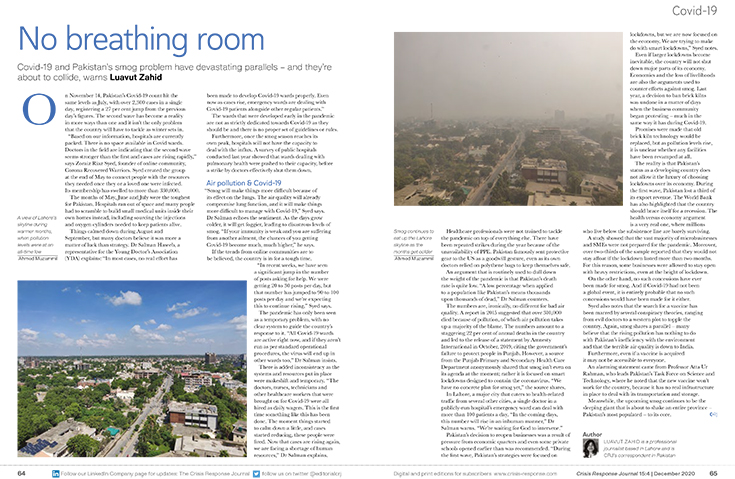
Global risk perception
Ali Malvern questions whether governments are learning from the first wave of the pandemic and if they are considering how society behaves when setting strategy and managing response
The unrelenting challenge
“Working together is what makes a difference at all levels,” says Jacqui Semple as she explores how resilience professionals can find support to help to prepare for the next stages of the pandemic
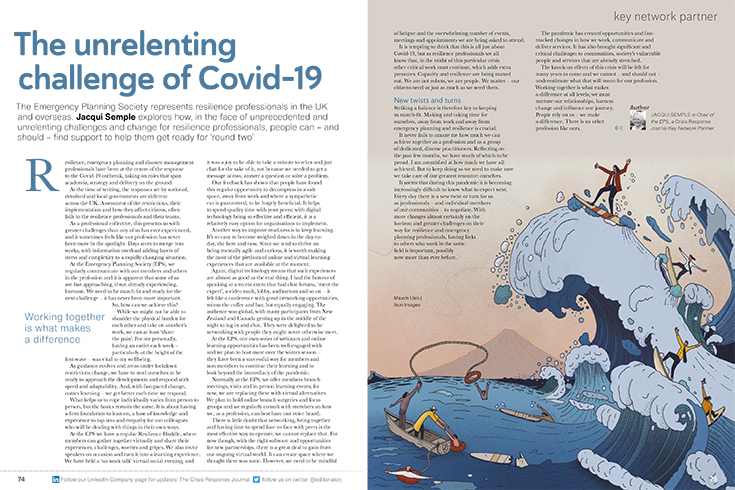
Survive and thrive
The flexibility, agility and inventiveness shown by many organisations during 2020 should provide the confidence needed for recovery, says Mike O’Neill
Supporting the medically fragile and socially vulnerable
Marcus T Coleman and Sarah Baker provide insights to help officials and community leaders lead their communities through crises and help to make sure that nobody is left behind
Covid, lockdowns and lives lost
Lyndon Bird presents an unflinching examination of the rationality of government policies and decisions
The human factor: ‘Hidden’ threats
Andy Blackwell explores hidden threats to civil aviation and provides guidance that is equally applicable to other sectors on the actions organisations can take to protect themselves, and safeguard their people, assets and reputation
Pandemic psychosocial problems
Todd Benham, Michelangelo Bortolin and Gregory Ciottone say it is imperative that psychosocial effects are addressed now
Connecting with young people
Attempts to encourage young people to change their behaviour during the Covid-19 pandemic have demonstrated that more needs to be done to connect with them as a matter of urgency, writes Amanda Coleman
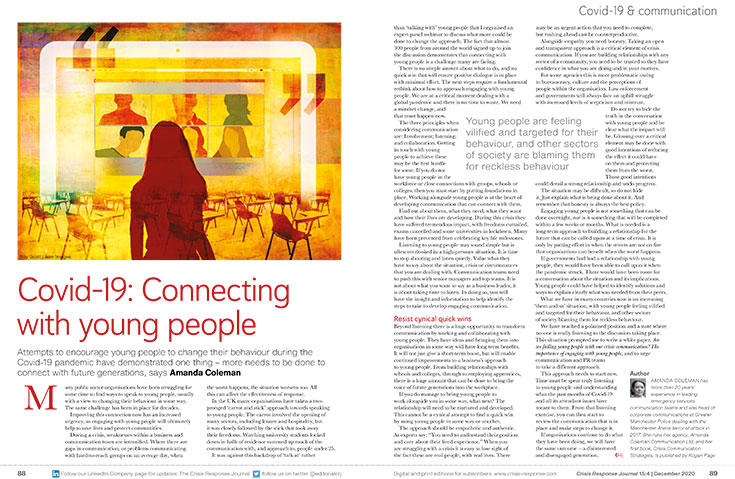
Take a deep breath…
Lyzi G Cota offers techniques that can help those who are accumulating signs of anxiety, depression, PTSD and even suicidal behaviour
Events
Multilateralism, leadership and climate justice
Mary Robinson, first woman President of Ireland, former UN High Commissioner for Human Rights and Chair of the Elders, says that the way forward must be through a clean, sustainable and healthy future
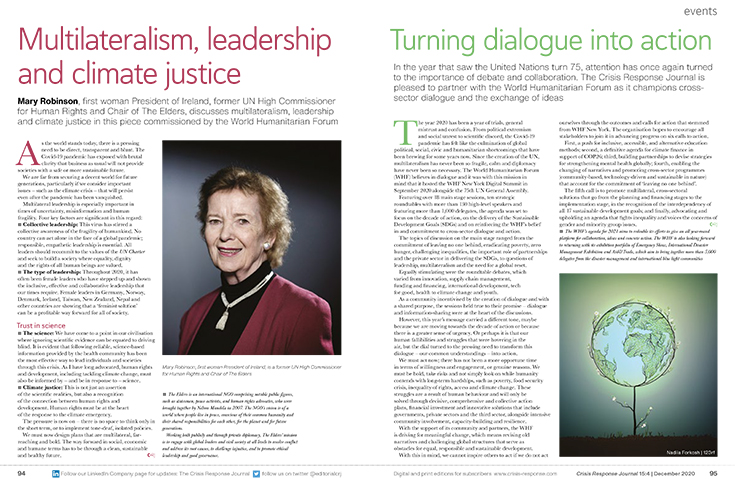
The case for investing in female entrepreneurs
Asahi Pompey of the Goldman Sachs Foundation comments on the devastating impacts that the Covid-19 crisis has had on small businesses, particularly those owned by women. This inherent equality needs to be addressed sooner rather than later, so that the global economy can benefit from the input of female entrepreneurs
Frontline: A force for good in Lebanon
Tamer Khatib joined the Palestinian Civil Defence in ‘Ayn al-Hilweh refugee camp in Lebanon. He tells Claire Sanders how the scheme is a force for good in the camps, especially for the younger generation
Click here for more details on how to subscribe